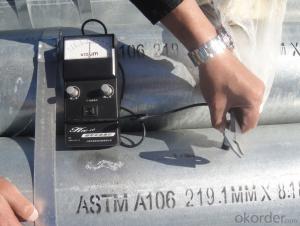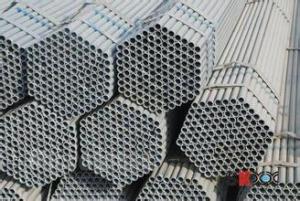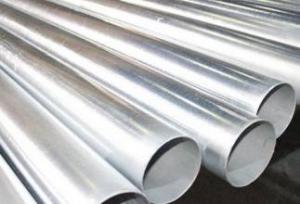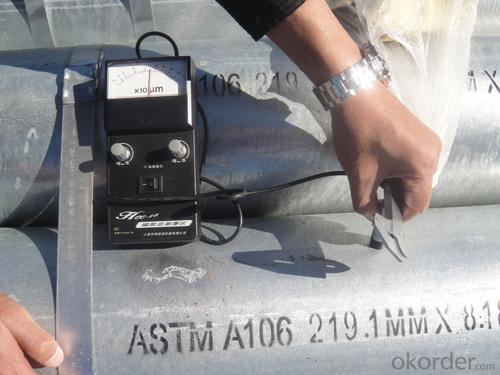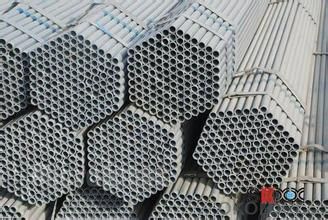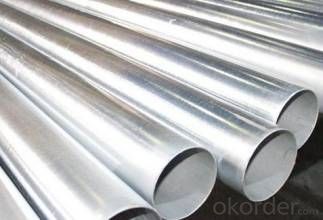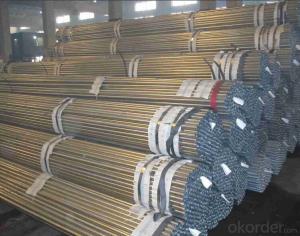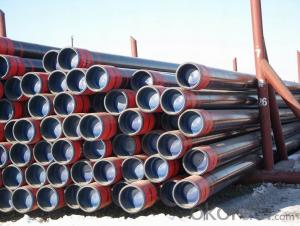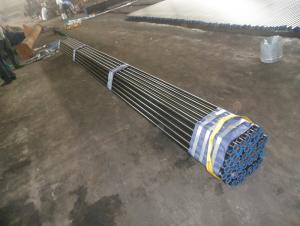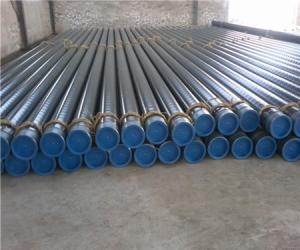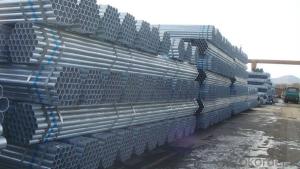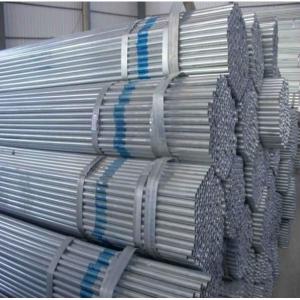Galvanized Hot Rolled Steel Pipe
- Loading Port:
- China Main Port
- Payment Terms:
- TT or LC
- Min Order Qty:
- -
- Supply Capability:
- -
OKorder Service Pledge
OKorder Financial Service
You Might Also Like
HOT-DIP GALVANIZED PIPE FOR FLUID TRANSPORTATION
1.OD:33.4-114.3mm
2.WT:2.0-9.0mm
3.Zinc:200~600g/m2
Good serveice
We Offer You:
HOT-DIP GALVANIZED PIPE FOR FLUID TRANSPORTATION
HOT-DIP GALVANIZED PIPE FOR FLUID TRANSPORTATION | |||
1. Material | Steel Grade | Q195, Q235, Q345 etc. | |
Material Type | Available in cold rolled and hot rolled | ||
2. Size | W.T | 1.0mm-12mm | |
Diameter | 20mm~273mm | ||
Length | 5.8m-14m | ||
3. Zinc Coating | 200~600g/m2, could be thicker or thinner if you need | ||
4. Certification | BV, IAF, SGS,COC, ISO etc. | ||
5. Welding Technology | Longitudinal ERW | ||
6. Application | Urban construction, machine structure, agriculture equipment, water and gas pipes etc. | ||
7. Packing | Packing in bundle with steel strips; with seaworthy package at the end; could be done with your requirement. | ||
8. Delivery Time | Usually within 10-30 days after receipt of deposit, ASAP | ||
9. Trade Terms | FOB, CFR, CIF etc. | ||
10. Payment Terms | T/T, L/C etc. | ||
11. Loading Port | Xingang , Tianjin | ||
12. Original Place | Tianjin, China | ||
13. Company Information | Name | Reliance Metal Resource Co., Ltd | |
Type | Manufacture and trading company | ||
Supply Ability | 360,000 tons per year | ||
Galvanized Round Steel Pipe's Materials
| Elements Material | Chemical Compsition% | Mechanical Property | ||||||
| C% | Mn% | S% | P% | Si% | Yield Point (Mpa) | Tensile Strength(Mpa) | Elongation (%) | |
| Q195 | 0.06-0.12 | 0.25-0.50 | <0.050 | <0.045 | <0.030 | >195 | 315-430 | 32-33 |
| Q215 | 0.09-0.15 | 0.25-0.55 | <0.05 | <0.045 | <0.030 | >215 | 335-450 | 26-31 |
| Q235 | 0.12-0.20 | 0.30-0.70 | <0.045 | <0.045 | <0.030 | >235 | 375-500 | 24-26 |
| Q345 | <0.20 | 1.0-1.6 | <0.040 | <0.040 | <0.55 | >345 | 470-630 | 21-22 |
FAQ of Galvanized Round Steel Pipe
①How is the quality of your products?
Our products are manufactured strictly according to national and internaional standard, and we take a test
on every pipe before delivered out. If you want see our quality certifications and all kinds of testing report, please just ask us for it.
Guaranteed: If products’ quality don’t accord to discription as we give or the promise before you place order, we promise 100% refund.
②How about price?
Yes, we are factory and be able to give you lowest price below market one, and we have a policy that “ for saving time and absolutely honest business attitude, we quote as lowest as possible for any customer, and discount can be given according to quantity”,if you like bargain and factory price is not low enough as you think, just don’t waste your time.Please trust the quotation we would give you, it is professional one.
③Why should you chose us?
Chose happens because of quality, then price, We can give you both.Additionally, we can also offer professional products inquiry, products knowledge train(for agents), smooth goods delivery, exellent customer solution proposals.Our service formula: good quality+good price+good service=customer’s trust
SGS test is available, customer inspection before shipping is welcome, third party inspection is no problem.
Galvanized Round Steel Pipe Image
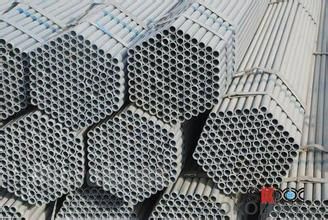
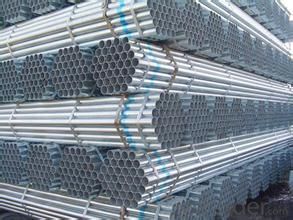
- Q: How are steel pipes used in the manufacturing of wastewater treatment systems?
- Steel pipes are commonly used in the manufacturing of wastewater treatment systems as they provide a durable and corrosion-resistant material for transporting and distributing water and chemicals within the system. They are used for various purposes such as conveying wastewater, carrying treated water to different stages of the treatment process, and transferring chemicals for disinfection or filtration. Additionally, steel pipes are often used for constructing the framework and support structures of wastewater treatment systems due to their strength and versatility.
- Q: Can steel pipes be used for marine applications?
- Yes, steel pipes can be used for marine applications. Steel pipes have high strength and durability, making them suitable for various marine environments and applications such as offshore drilling, shipbuilding, and underwater pipelines. The corrosion-resistant properties of steel pipes can be further enhanced by applying protective coatings or using corrosion-resistant alloys, ensuring their long-term performance in marine conditions.
- Q: What are the factors that affect the pressure rating of steel pipes?
- The pressure rating of steel pipes can be influenced by various factors. These factors include the strength of the material used, the thickness of the pipe wall, the diameter of the pipe, the temperature at which it operates, its resistance to corrosion, compliance with manufacturing standards, and the impact of external loads. The strength of the steel plays a crucial role in determining the pressure rating. Steel with higher strength can handle higher pressure levels, while weaker grades may have lower ratings. Thicker walls provide more resistance against internal forces, allowing pipes to handle higher pressures. The diameter of the pipe also affects its pressure rating. Larger pipes generally have higher ratings due to their larger cross-sectional area. High temperatures can weaken steel, reducing its strength and pressure rating. Therefore, maximum operating temperature should be considered. Corrosion can weaken the pipe material over time, leading to a decrease in pressure rating. Factors such as fluid type, pH levels, and environmental conditions can impact corrosion resistance. Compliance with industry standards is crucial in determining pressure ratings. These standards ensure proper manufacturing techniques and materials are used. External loads such as soil settlement or traffic can affect pressure ratings. Proper design, installation, support, and protection are necessary to maintain the pressure rating. Considering all these factors and consulting industry guidelines is important for determining appropriate pressure ratings for steel pipes in different applications.
- Q: Can steel pipes be used for automotive applications?
- Yes, steel pipes can be used for automotive applications. Steel pipes are commonly used for various automotive components such as exhaust systems, fuel lines, and structural frames due to their high strength, durability, and resistance to corrosion. They provide reliable performance and are cost-effective in automotive manufacturing.
- Q: Can steel pipes be used for the construction of railway tracks?
- No, steel pipes are not suitable for the construction of railway tracks. Railway tracks require specialized rails made of steel that are specifically designed to withstand the heavy loads and constant wear and tear associated with train traffic. Pipes do not have the necessary shape, strength, or durability to serve as railway tracks.
- Q: What is the creep resistance of steel pipes?
- The ability of steel pipes to withstand deformation or elongation over time when exposed to high temperatures and constant stress is referred to as their creep resistance. Steel pipes are highly regarded for their exceptional resistance to creep because of the inherent strength and stability of the material. The creep resistance of steel pipes can vary depending on factors like the composition of the alloy, heat treatment, and the conditions in which they are used. Creep is a phenomenon that occurs at elevated temperatures, causing materials to slowly deform under constant stress. In the case of steel pipes, this can be a concern in applications where they are subjected to high temperatures for extended periods, such as in power plants, industrial furnaces, or steam pipelines. The ability to resist creep deformation is crucial to maintain the structural integrity and longevity of the pipes. Steel pipes are often designed and manufactured using alloys with high creep resistance properties, such as chromium-molybdenum (Cr-Mo) steels or nickel-based alloys. These alloys possess excellent mechanical strength, thermal stability, and resistance to oxidation and corrosion, all of which contribute to their superior creep resistance. Moreover, heat treatment processes like quenching and tempering can significantly enhance the creep resistance of steel pipes. These treatments involve controlled heating and cooling cycles to optimize the microstructure of the steel, thereby increasing its resistance to deformation and improving its overall performance at high temperatures. It is important to note that the creep resistance of steel pipes is typically specified by industry standards and codes, such as the American Society of Mechanical Engineers (ASME) Boiler and Pressure Vessel Code. These standards define the allowable stress levels and design criteria for different steel pipe applications, ensuring that they meet the necessary safety and performance standards. In summary, steel pipes are renowned for their excellent creep resistance due to their inherent strength, stability, and ability to withstand high temperatures. The specific creep resistance of steel pipes may vary depending on factors such as alloy composition, heat treatment, and operating conditions. Proper design and adherence to industry standards are essential to ensure the desired creep resistance and overall performance of steel pipes in various applications.
- Q: What are the common standards for coating and lining of steel pipes?
- The most common standards for coating and lining of steel pipes include the American Petroleum Institute (API) standards such as API 5L, API 5CT, and API 5LD. Other widely recognized standards include the American Water Works Association (AWWA) standards such as AWWA C210 and AWWA C213, as well as the National Association of Corrosion Engineers (NACE) standards such as NACE RP0188 and NACE RP0394. These standards ensure the proper selection, application, and performance of coatings and linings to protect steel pipes from corrosion and other external factors.
- Q: Can steel pipes be used for irrigation pivot systems?
- Yes, steel pipes can be used for irrigation pivot systems. They are often preferred due to their durability, strength, and resistance to corrosion. Steel pipes can efficiently transport water over long distances, making them suitable for irrigation pivot systems that require reliable water supply.
- Q: How are steel pipes used in the construction of airports?
- Steel pipes are commonly used in the construction of airports for various purposes such as drainage systems, water supply lines, fuel pipelines, and structural supports. They provide durability, strength, and corrosion resistance, ensuring the efficient operation and safety of airport infrastructure.
- Q: How do steel pipes handle chemical substances?
- Steel pipes are highly resistant to chemical substances due to their high strength and corrosion-resistant properties. They can safely handle a wide range of chemical substances without undergoing any significant degradation or damage.
Send your message to us
Galvanized Hot Rolled Steel Pipe
- Loading Port:
- China Main Port
- Payment Terms:
- TT or LC
- Min Order Qty:
- -
- Supply Capability:
- -
OKorder Service Pledge
OKorder Financial Service
Similar products
Hot products
Hot Searches
Related keywords
